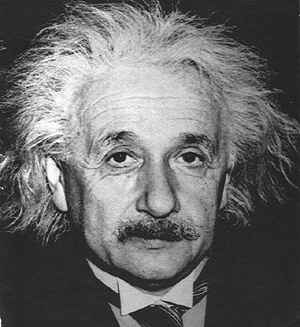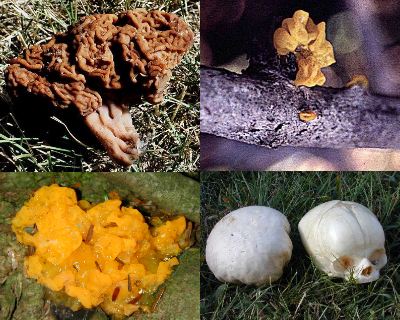 Albert Einstein was born on March 14, 1879 in Ulm, Germany. For those of you challenged in math, that's 125 years ago this month. Albert Einstein is, of course, famous for his theories of relativity and many other advances in Physics, if you can include such astonishments as shattering Newtonian physics in the category of "advances". He was even humble enough to apologize to Newton for this "dastardly deed" when constructing his autobiographical notes. We don't have any evidence that Einstein cared anything for fungi, but he probably did know a thing or two about mushroom clouds. We decided to honor this great scholar and human being on his birthday. It will be fitting to tell you first a little about his life and accomplishments.
Albert Einstein was born on March 14, 1879 in Ulm, Germany. For those of you challenged in math, that's 125 years ago this month. Albert Einstein is, of course, famous for his theories of relativity and many other advances in Physics, if you can include such astonishments as shattering Newtonian physics in the category of "advances". He was even humble enough to apologize to Newton for this "dastardly deed" when constructing his autobiographical notes. We don't have any evidence that Einstein cared anything for fungi, but he probably did know a thing or two about mushroom clouds. We decided to honor this great scholar and human being on his birthday. It will be fitting to tell you first a little about his life and accomplishments.
Despite nearly failing mathematics in grade school, Albert earned his doctorate degree in Physics and Mathematics in 1905; a year that proved to be most monumental in the minds of intensive thinkers throughout the world (often referred to as "Annus Mirabilis," or the Miracle Year). It was early in 1905, when Einstein was a lowly patent examiner at the ripe old age of 26 in Bern, Switzerland, that he first dabbled in relativity, and theorized that space and time are not constant, but rather relative to your speed (leading to Special Relativity). By March 1905 he dawned the idea of light as photons in the Quantum Theory of Light, followed quickly in April with unleashing proof of minute particles we know as atoms. Then by the end of the year, after admitting that his first theory was "special," Albert defined the energy content of a body as equal to the mass of that body times the speed of light (E=mc2). He even went as far as foiling the imagination of the daydreamer by answering that undying question, "Why is the sky blue?" in 1910.
If you throw in spawning cosmology and modern string theory it's no wonder Albert Einstein won the Nobel Prize in Physics in 1921. According to the Nobel Prize website, Einstein won "for his services to Theoretical Physics, and especially for his discovery of the law of the photoelectric effect," but if you ask us, their reasoning fell a few Tabernacles short of a full choir in summing up this genius. This is especially true if you chalk up, the fourth state of matter (after gas, liquid, and solid) called the Bose-Einstein condensate, which was predicted by Einstein, but not created and discovered until 1995. How often does someone come away with something as fundamental as that?
In 1933 Einstein renounced his German citizenship on political grounds and immigrated to America to become Professor of Theoretical Physics at Princeton, where he became a U.S. citizen in 1940. After World War II, he was offered the presidency of the newly created state of Israel, which he unfortunately declined; otherwise whose knows what the current situation in Israel would be like. One thing the world can be sure of though is that Physics classes are immensely more confusing because this man walked the Earth.
According to the Nobel prize website:
"At the start of his scientific work, Einstein realized the inadequacies of Newtonian mechanics and his theory of special relativity [1905] stemmed from an attempt to reconcile the laws of mechanics with the laws of the electromagnetic field." His work was the first merger of mechanics and quantum theory. In 1916 he published his theory of general relativity. Einstein later explained relativity:
"When you sit with a nice girl for two hours, you think it's only a minute. But when you sit on a hot stove for a minute, you think it's two hours. That's relativity."
Einstein said many other interesting things before he died in 1955.
There's actually a famous bluegrass song called "Einstein was a genius." The best version of it we found online is at this page. It's a fun song. It's not surprising that it's a bluegrass song, because Einstein loved to play the fiddle and dance around.
Looking at the Einstein calendar in the office, we decided to honor a very interesting man on the anniversary of his birth. The problem is, which fungus to choose for this occasion?
There were some obvious choices:
- The brain fungus, Gyromitra esculenta, was the obvious first choice. But since we had already done a page on this false morel, our search continued.
- What about the yellow brain fungus, Tremella mesenterica, also known as witch's butter? OK we had done that one already too. Darn!
- That brought to mind the orange brain fungus, Dacrymyces palmatus. We didn't think we could fill up a whole page with that one (although we've done more with less...). Besides April's FotM is going to be a jelly fungus (can you guess which one, in honor of Easter?), so we didn't want to jelly the minds of our readers.
- How about the brain puffball, Calvatia craniformis? This puffball looks a lot like a brain or a skull, but we already have a Calvatia page, and Calvatia gigantea has already been Fungus of the Month. Calvatia craniformis has also already shown up on the Mycological Easter egg hunt page.
- What about a fungus that infects the brain? One common one is the yeast Cryptococcus neoformans. It can cause meningitis (infection of the meninges, the lining of the brain) and infect other parts of the brain and spinal cord, especially in immunocompromised people. However we did not think Einstein would have appreciated a brain infection to honor him.
- While picking our minds further, we stumbled upon another phrenetic fungus, but it was one we could not determine how Einstein would approve. Several Fusarium species produce a group of mycotoxins called fumonisins. These cause a disease called blind staggers or moldy corn disease, that results in a liquefaction of the brain in horses. The technical name is Equine Leukoencephalomalacia (ELEM). The liquefaction leads to signs of frenzy, aimless circling, and hyperexcitability (sounds like some people we know!). This would initially seem a dark subject that Albert would surely not wish to be honored with, but he was known to have a sense of humor, especially when discussing the foolhardy people of the world. We can just imagine him alive today, straining his brain wondering if there are rampant cases of Anthropoleukoencephalomalacia melting the minds of everyone, but then laughing hysterically when he realizes the liquefaction is merely a result of watching too much modern TV. In fact this may have been in the depths of Einstein's mind when he said,
"Two things are infinite: the universe and human stupidity; and I'm not sure about the universe."
 Well, by this time our brains were feeling a little liquefied, and that was all the brain fungi we could muster up for awhile, but then, aha! What about Smart mushrooms? When one of us (TJV) visited Amsterdam in the Netherlands a few years ago there were many so-called "Smart Shops" that sold hallucinogenic Psilocybe and Amanita muscaria mushrooms, among other things that are supposed to make you smart. We're not quite ready for that yet...
Well, by this time our brains were feeling a little liquefied, and that was all the brain fungi we could muster up for awhile, but then, aha! What about Smart mushrooms? When one of us (TJV) visited Amsterdam in the Netherlands a few years ago there were many so-called "Smart Shops" that sold hallucinogenic Psilocybe and Amanita muscaria mushrooms, among other things that are supposed to make you smart. We're not quite ready for that yet...
- We all know that Einstein was a genius. Maybe we could write something about Genius and Species? Or being a genius at identifying species. Hmmmm... that's not quite right... NEXT...!
- How about a fungus that uses physics? What about Pilobolus crystallinus, the hat thrower? Pilobolus can focus light with its "lens," shooting its spores mass in the direction of the light and away from the dung it's growing in. Well that's probably going to take a lot more than just one page to explain, so we'll defer that one until later.

- How about Einstein's theories of relativity, which designated which mushrooms are related to each other? We don't think that's quite what Einstein had in mind. Einstein theorized about general relativity and special relativity. Surely everyone's got some "special" relatives they theorize about, or wonder how "special" mushrooms affected them. This "relativity" is vividly portrayed by the "special" destination of our bus on the 2003 NAMA foray in Quebéc.

- So next we tried to make something out of Einstein's famous equation, E=mc2 --- how could we tie that into Mycology? We came up with several attempts:
- Edibility = Mushroom connoisseur2
- Erysiphe= Mildewey Citrus2
- Ecosystem= Mycorrhizal Companions2
- Everything= MyCology2 (because ultimately everything eventually comes down to Mycology...)
Perhaps you can come up with something better? We'll post the best ones here.
